namkcuR
ONE love, blood, life
Apologies for the excessive length, but I feel like this record deserves it.
Thirty years ago this week, on October 1, 1984, U2 released their fourth LP, The Unforgettable Fire, named after an exhibit the band had seen about Hiroshima.
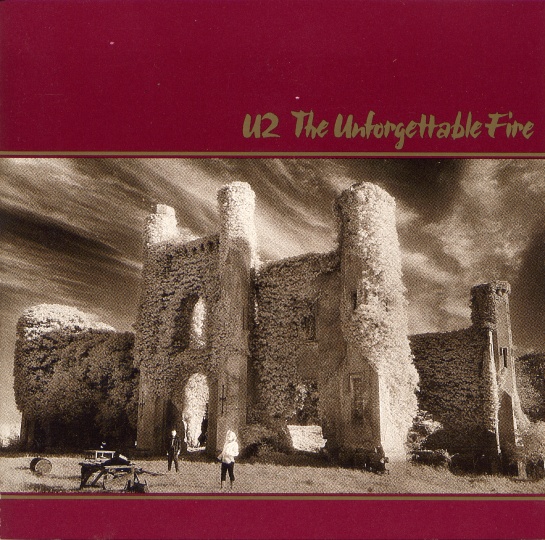
It is difficult to overstate how important this record was for their career. It was a new beginning, artistically and commercially.
After their first trio of post-punk flavored and influenced records, the last of which, War, spawned classics Sunday Bloody Sunday and New Year's Day, U2 took a left turn. They left incumbent producer Steve Lillywhite and convinced former Roxy Music member and producer of David Bowie's "Berlin" trilogy, Brian Eno, and his protege Daniel Lanois to come aboard and help them craft a new, more atmospheric, more ambient sound than the hard-hitting post-punk of their early LPs. Bono began writing in a more poetic style than he had been(I personally think this record was a big jump for him lyrically). Edge adopted a more minimalist approach to playing guitar. The rhythm section was less in-your-face than they had been before. Keyboards were used to a degree the band hadn't used them before.
The band and their new production team set up shop at Slane Castle to record the new project in May 1984 and stayed there until June, using the natural acoustics of the place to, in Bono's words, "tame their sound". They then moved to Windmill Lane from June until the record's completion in August. The recording process was not overly easy. There were tensions between the band and the production team, as Eno didn't show as much interest in the more traditional tunes like the two that ended up being singles(resulting in Lanois having to cover for him) and the band was having problems - as would become a recurring issue for them - finishing things. The band worked 20 hour days in the final weeks to finish the album.
In the first week of September, the record's first single, the seminal Pride(In The Name Of Love), was released. One of two songs on the LP that would prove instrumental in their nascent ascendence to superstardom, this track would accomplish something for U2 that they had been chasing since their start half a decade earlier; it was their first commercially successful single in the U.S.(yes, even back then, they wanted a big single, but back then it wasn't just about relevance, it was about surviving as a band), reaching as high as #33 on the Billboard chart(that may not seem that high, but their previous high in the U.S. was #53 with New Year's Day). It was their break into America. It is a stone-cold classic, and most, even those who are tired of it live, would probably agree that it's one of U2's greatest studio recordings. It's unabashedly anthemic, as previous U2 singles had been, but this time, the anthem was wrapped in lush, warm soundscapes and gorgeous textures that gave it a kind of liftoff that U2 hadn't really accomplished too much before, a kind of liftoff that U2 would aspire to on and off for the remainder of their career.
The single's b-sides were the pair of sonic experimentations Boomerang I and Boomerang II.
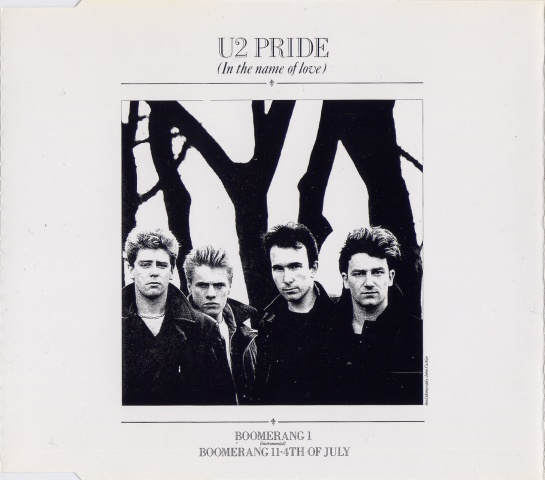
A month later, when the full LP was released on October 1, it became obvious that Pride was just the tip of the iceberg of the band's new sound.
The opener, A Sort Of Homecoming, is a propellant, uplifting number that conjures up the world the record will take place in, and makes clear immediately that this is a different, more cinematic, more epic, more complex, more mature U2 than the one that had made the first three records. The evocative lyric about coming home, maybe physically, maybe spiritually, delivered via a vocal performance in which Bono is giving it everything he's got against a vibrant, heart-pounding musical backdrop, makes for a rousing opener.
Pride follows at number two, where its often been said that it doesn't fit well, but I wonder if that's often said simply because we've heard it so much in comparison to the songs surrounding it.
Wire is a rocker that sounds like no other the band has ever written. "Atmospheric rocker" sounds like an oxymoron, but it's how I'd describe this track. It almost sounds like they could be playing this outside in the middle of some kind of natural disaster, a tornado or blizzard or something. The instrumentation is intense and frenzied and Bono's vocal is impassioned and rough at the same time, all over the place, in a good way. It's an almost panicked and disturbed delivery that really fits the mood of the instrumentation. It makes a for a really great and unique song. I always thought it could've been a good single. The chorus is catchy, sing-along-able, and it kicked ass live. They really should dust it off and play it again before they call it a day.
The record's title track was released as the second single in the Spring of 1985, but wasn't as successful as Pride. It is retrospectively seen as a classic though, and its resurrection for the 360 tour after not having been played for over two decades was one of that tour's great moments. The song, imo, is one of the greatest the band has ever written and recorded. The lyrics are abstract and evocative. The dynamic between the dark, brooding verses and the soaring keyboard-driven chorus works fantastically. The middle-8 with the orchestration and the baseline was one of the big "this isn't just any band" moments of my early fandom. And of course, Bono's vocal take on this studio version is one of his greatest ever. It feels like you can actually hear him growing from the kid that sang on the first few records into the legendary frontman of subsequent records. A tremendous track.
The single's b-sides were the melancholic, melodic Love Comes Tumbling, the uplifting anthem The Three Sunrises, the atmospheric string-based instrumental Bass Trap, and the sonic excursion of Sixty Seconds In Kingdom Come.
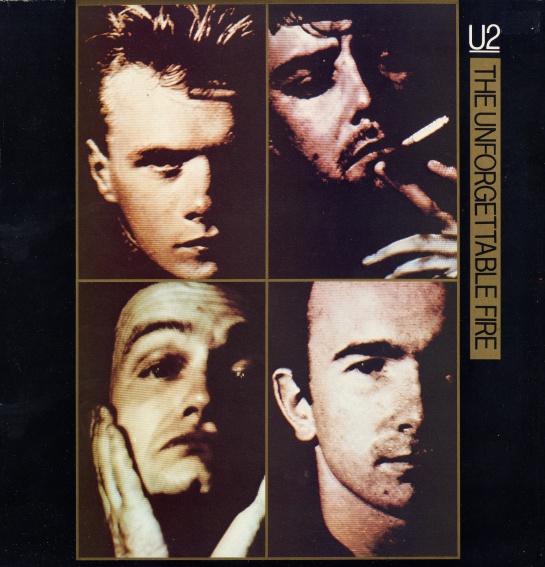
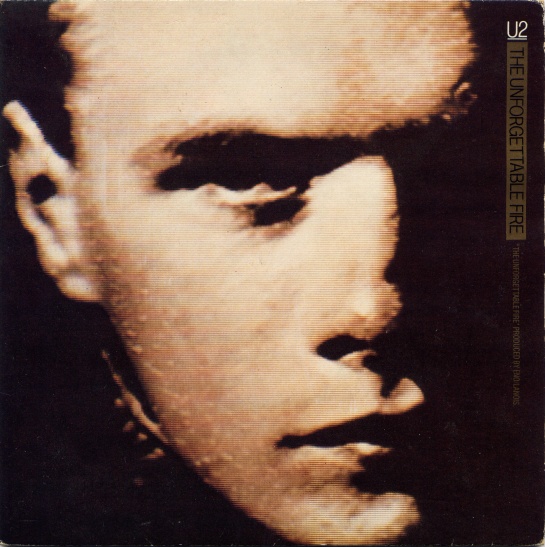
The first side of the LP is closed with Promenade, one of the quietest, most delicate, and frankly, most gorgeous ballads U2 has ever put on record. Edge, Adam, and Larry provide a gentle, bubbly, somehow simultaneously warm and cold, soundscape as Bono sings a beautiful, longing melody over it with a subtly that he is not exactly known for. The ending of this track gets me every time - Bono's aching delivery of "Oh, tell me, Cherry you dance with me, up through the spiral staircase, to the higher ground", and then the hypnotic fade-out of "Slideshow of a seaside down, Coca-cola, football, radio, radio, radio, radio, radio, radio". A totally unpretentious track that doesn't try to be anything but the beautiful, short little gem it is.
4th Of July has a special place in U2's history: it is the only instrumental track to ever be on a U2 record that wasn't Passengers. There have been instrumental b-sides, but this is the only one that ever appeared on a record with the "U2" label. I don't know where the title came from, but I've always felt that it could more accurately have been called "Prelude to Bad" or "Overture to Bad". It's a nice, swirling mass of atmosphere. It almost sounds like strings being played gently outside on a windy Autumn day, such that the sounds of the strings get carried away in the breeze. It occupies the same sonic terrain as, and segues perfectly into, the epic next track.
I mentioned that Pride was one of two tracks that would prove instrumental in U2's subsequent rise. Bad is the other. It was never released as a single, but a live version was the headlining track on the Wide Awake In America EP, released in the Spring of 1985 alongside the title track's release as single. That single wasn't a big hit, but the live version of Bad from Wide Awake In America, which also included a live version of A Sort Of Homecoming as well as Love Comes Tumbling and The Three Sunrises, got a lot of radio play and became quite popular. The song only got more popular when U2 played it to the planet at Live Aid in the summer of 1985. Up to this point in their career, U2 had really built their reputation largely on the back of their live performances, having not yet had a smash record or single, and the Live Aid performance continued that tradition. It turned a lot of heads and got people talking about U2. The song became a staple of their live setlists in the late 80s, and was played for a stretch of ZooTV, at a few Popmart shows, was a regular again for the Elevation Tour, and has been played sporadically on the most recent tours. It is still almost always a special moment if and when the band pulls Bad out. But as tremendous as the guitar-driven live versions are, I'd be remiss to not point out the certain majesty and beauty of the more quieter, more keyboard-driven studio version. Either way, it's one the most epic and most important tracks in the U2 catalog.
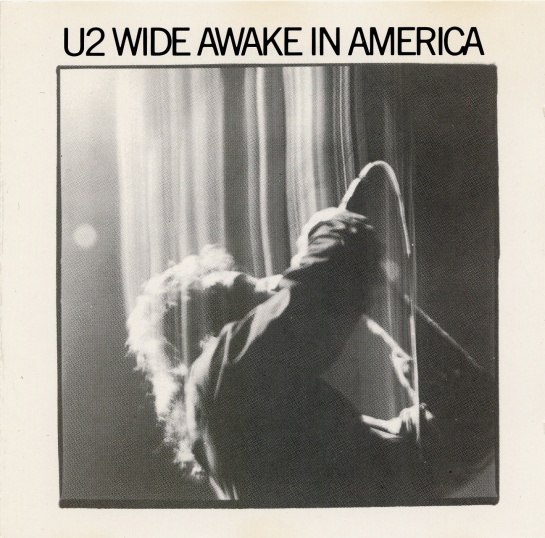
While the record up to this point is generally universally loved, the next two tracks offer more varied reactions.
Indian Summer Sky is driven by a pulsating beat and vocals that build in energy in each verse, each reaching a crescendo with the words "blue sky". As Bono reaches those words, you might expect the song to lift off into the type of soaring chorus that would soon be typical of U2. But it doesn't. Instead it dips down to a slower pace, becomes quieter, as Bono sings the closest thing the song has to a chorus - "to lose along the way, the spark that set the flame, to flicker and to fade, on this, the longest day" - to a bittersweet melody that stands in contrast to the more energetic, generally optimistic verses. Perhaps this atypical chorus, the lack of an anthemic chorus where it feels like there could be one, is one of the reasons why some are neutral or even lukewarm to this song. Others might argue that the dynamics work really well, that it's kind of ingenious how the "so wind go through to my heart, so window blow through my soul" middle 8 starts(both times) with the quietness of the chorus and builds back up to the faster, more upbeat "you give yourself to this the longest day, you give yourself, you give it all away" bridge and subsequent verse. I can see how some would feel that it's not as exciting as it could be, but to me, its unique nature and structure is exciting in itself.
We have reached the record's penultimate track. There are two kinds of people in the world: those for whom Elvis Presley And America is mysteriously, captivatingly beautiful and haunting, and those for whom it is not. I have seen, here on Interference, Elvis Presley And America be described with words like "majestic", "gorgeous", "ambient masterpiece", and also with phrases like "tuneless", "unfocused", or phrases like "worst thing they ever recorded". I am paraphrasing and generalizing here, but that's the gist. This is one of the most divisive tracks in the entire, nearly forty-year-long U2 songbook. I fall on the positive side with it, but there's no denying it requires a certain taste, and that it's not everyone's cup of tea. There are no verses or choruses or bridges here. The reality, according to Bono, is that it was recorded in five minutes at the behest of Brian Eno, and Bono is just singing totally off the cuff over what is actually the backing track of A Sort Of Homecoming, slowed down and played backwards. As a result, the lyrics don't make a whole lot of sense, but that adds to the song's charm, at least for those who like it. One could think of it as the closest thing to Bonoglese that ever made a finished record. In that respect, it is indeed unfocused, but for those with whom this track resonates, that's part of the magic. The incoherence of much of the lyrics combined with the hazy, almost muffled nature of the recording makes for a truly unique track. Listening to it, it feels like you're twenty thousand leagues under the sea, or in outer space, or on Earthly land but under the influence of something or rather.
The record closes with MLK, which is more a prayer than a song, a simple verse repeated twice with slight variations in lyric and melody. "Sleep, sleep tonight", Bono sings calmly over a sparse, atmospheric instrumentation in which you can hear bass, maybe a hint of organ, and what sounds like wind, "and may your dreams be realized, if the thunder cloud passes rain, so let it rain, rain down on he." It's a perfect end to an atmospheric, largely meditative record.
This record occupies a unique place on the road that U2 have traveled.
Artistically, it was the band giving birth to their own unique sound, what become known as the "U2 sound", after having largely spent their early years inhabiting the punk and post-punk sounds that had inspired them to want to be in a band in the first place. There were certainly obvious hints of that emergent sound on "War", which itself was also a big step forward, but this was a record-wide, purposeful re-invention of sound.
Commercially, it set the stage for what would become U2's prime years. With the success of Pride and the WAIA and Live Aid performances of "Bad", U2 ended this album/tour cycle with more attention on them than they'd ever had before. It had been the first tour on which they'd headlined big venues - i.e. arenas and stadiums(although it wasn't only big venues, they wouldn't be doing only big venues until the third leg of the subsequent tour). Additionally, because The Unforgettable Fire was the last record on their original deal with Island, a new deal was negotiated that gave the band, for the first time, financial security. So, this record was a breakthrough in that it had two tracks that got the mainstream's attention, enabled them to headline big venues for the first time, and put them in a position to become financially secure. They were on the cusp of being BIG.
They would of course capitalize on all of this by releasing the monster that was The Joshua Tree less than two years after Live Aid, and the rest is history.
So the record is a kind of re-birth, and a prelude to their prime years, but because it's a prelude to their prime years, it's also the last record they made before they became "U2", before superstardom. They would never again be as free of expectation, as free of the weight of being U2. The proof of that is in the tracklisting. Tracks like Promenade and 4th Of July and Elvis Presley And America probably wouldn't have made it onto a U2 record in 1987 or 1988, and they certainly wouldn't now. They just wouldn't. They might be released at some point as b-sides(or as they're called now, "bonus tracks"), or perhaps be saved and re-worked, added to, etc, or maybe just put in the U2 vault never to be heard from again(To be fair, Fez-Being Born, White As Snow, and Cedars Of Lebanon, some of their most esoteric tracks in years, made No Line On The Horizon, which was and is a pleasant surprise, but that's hardly the norm). But at that point in time, they put those tracks on the record, because being just U2, and not "U2" yet, gave them the freedom to do so. They weren't the biggest band in the world yet, they were just a hungry young band who had hit a vein of inspiration as they matured musically. I think of that lyric from Indian Summer Sky:
To lose along the way
The spark that set the flame
To flicker and to fade
On this, the longest day
You look at the band today, and even when they put out quality work - and I'm digging Songs Of Innocence - it's taking them longer and longer to do so. A good deal of the material from the last two records suggests that the spark is still there, but maybe it's taking them longer to find it with each record than it did before. The Unforgettable Fire is the sound of a band that didn't have to look for that spark at all. No, that spark is all over this record.
One might argue that, for instance, All That You Can't Leave Behind is a more important record for the band as a late-career revival, or that something like Zooropa is a greater artistic achievement, but when you look at the combined importance to their career and artistic achievement of The Unforgettable Fire, it's easy to see why so many rank the record right up there with The Joshua Tree and Achtung Baby.
Thirty years on, it's still "Unforgettable".
Congratulations if you made it to the end of this.
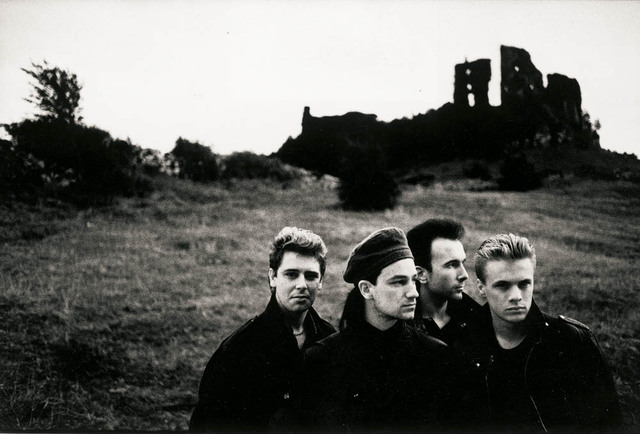
There are other great photos from this era here: U2 > Gallery > Unforgettable Fire
Thirty years ago this week, on October 1, 1984, U2 released their fourth LP, The Unforgettable Fire, named after an exhibit the band had seen about Hiroshima.

It is difficult to overstate how important this record was for their career. It was a new beginning, artistically and commercially.
After their first trio of post-punk flavored and influenced records, the last of which, War, spawned classics Sunday Bloody Sunday and New Year's Day, U2 took a left turn. They left incumbent producer Steve Lillywhite and convinced former Roxy Music member and producer of David Bowie's "Berlin" trilogy, Brian Eno, and his protege Daniel Lanois to come aboard and help them craft a new, more atmospheric, more ambient sound than the hard-hitting post-punk of their early LPs. Bono began writing in a more poetic style than he had been(I personally think this record was a big jump for him lyrically). Edge adopted a more minimalist approach to playing guitar. The rhythm section was less in-your-face than they had been before. Keyboards were used to a degree the band hadn't used them before.
The band and their new production team set up shop at Slane Castle to record the new project in May 1984 and stayed there until June, using the natural acoustics of the place to, in Bono's words, "tame their sound". They then moved to Windmill Lane from June until the record's completion in August. The recording process was not overly easy. There were tensions between the band and the production team, as Eno didn't show as much interest in the more traditional tunes like the two that ended up being singles(resulting in Lanois having to cover for him) and the band was having problems - as would become a recurring issue for them - finishing things. The band worked 20 hour days in the final weeks to finish the album.
In the first week of September, the record's first single, the seminal Pride(In The Name Of Love), was released. One of two songs on the LP that would prove instrumental in their nascent ascendence to superstardom, this track would accomplish something for U2 that they had been chasing since their start half a decade earlier; it was their first commercially successful single in the U.S.(yes, even back then, they wanted a big single, but back then it wasn't just about relevance, it was about surviving as a band), reaching as high as #33 on the Billboard chart(that may not seem that high, but their previous high in the U.S. was #53 with New Year's Day). It was their break into America. It is a stone-cold classic, and most, even those who are tired of it live, would probably agree that it's one of U2's greatest studio recordings. It's unabashedly anthemic, as previous U2 singles had been, but this time, the anthem was wrapped in lush, warm soundscapes and gorgeous textures that gave it a kind of liftoff that U2 hadn't really accomplished too much before, a kind of liftoff that U2 would aspire to on and off for the remainder of their career.
The single's b-sides were the pair of sonic experimentations Boomerang I and Boomerang II.

A month later, when the full LP was released on October 1, it became obvious that Pride was just the tip of the iceberg of the band's new sound.
The opener, A Sort Of Homecoming, is a propellant, uplifting number that conjures up the world the record will take place in, and makes clear immediately that this is a different, more cinematic, more epic, more complex, more mature U2 than the one that had made the first three records. The evocative lyric about coming home, maybe physically, maybe spiritually, delivered via a vocal performance in which Bono is giving it everything he's got against a vibrant, heart-pounding musical backdrop, makes for a rousing opener.
Pride follows at number two, where its often been said that it doesn't fit well, but I wonder if that's often said simply because we've heard it so much in comparison to the songs surrounding it.
Wire is a rocker that sounds like no other the band has ever written. "Atmospheric rocker" sounds like an oxymoron, but it's how I'd describe this track. It almost sounds like they could be playing this outside in the middle of some kind of natural disaster, a tornado or blizzard or something. The instrumentation is intense and frenzied and Bono's vocal is impassioned and rough at the same time, all over the place, in a good way. It's an almost panicked and disturbed delivery that really fits the mood of the instrumentation. It makes a for a really great and unique song. I always thought it could've been a good single. The chorus is catchy, sing-along-able, and it kicked ass live. They really should dust it off and play it again before they call it a day.
The record's title track was released as the second single in the Spring of 1985, but wasn't as successful as Pride. It is retrospectively seen as a classic though, and its resurrection for the 360 tour after not having been played for over two decades was one of that tour's great moments. The song, imo, is one of the greatest the band has ever written and recorded. The lyrics are abstract and evocative. The dynamic between the dark, brooding verses and the soaring keyboard-driven chorus works fantastically. The middle-8 with the orchestration and the baseline was one of the big "this isn't just any band" moments of my early fandom. And of course, Bono's vocal take on this studio version is one of his greatest ever. It feels like you can actually hear him growing from the kid that sang on the first few records into the legendary frontman of subsequent records. A tremendous track.
The single's b-sides were the melancholic, melodic Love Comes Tumbling, the uplifting anthem The Three Sunrises, the atmospheric string-based instrumental Bass Trap, and the sonic excursion of Sixty Seconds In Kingdom Come.


The first side of the LP is closed with Promenade, one of the quietest, most delicate, and frankly, most gorgeous ballads U2 has ever put on record. Edge, Adam, and Larry provide a gentle, bubbly, somehow simultaneously warm and cold, soundscape as Bono sings a beautiful, longing melody over it with a subtly that he is not exactly known for. The ending of this track gets me every time - Bono's aching delivery of "Oh, tell me, Cherry you dance with me, up through the spiral staircase, to the higher ground", and then the hypnotic fade-out of "Slideshow of a seaside down, Coca-cola, football, radio, radio, radio, radio, radio, radio". A totally unpretentious track that doesn't try to be anything but the beautiful, short little gem it is.
4th Of July has a special place in U2's history: it is the only instrumental track to ever be on a U2 record that wasn't Passengers. There have been instrumental b-sides, but this is the only one that ever appeared on a record with the "U2" label. I don't know where the title came from, but I've always felt that it could more accurately have been called "Prelude to Bad" or "Overture to Bad". It's a nice, swirling mass of atmosphere. It almost sounds like strings being played gently outside on a windy Autumn day, such that the sounds of the strings get carried away in the breeze. It occupies the same sonic terrain as, and segues perfectly into, the epic next track.
I mentioned that Pride was one of two tracks that would prove instrumental in U2's subsequent rise. Bad is the other. It was never released as a single, but a live version was the headlining track on the Wide Awake In America EP, released in the Spring of 1985 alongside the title track's release as single. That single wasn't a big hit, but the live version of Bad from Wide Awake In America, which also included a live version of A Sort Of Homecoming as well as Love Comes Tumbling and The Three Sunrises, got a lot of radio play and became quite popular. The song only got more popular when U2 played it to the planet at Live Aid in the summer of 1985. Up to this point in their career, U2 had really built their reputation largely on the back of their live performances, having not yet had a smash record or single, and the Live Aid performance continued that tradition. It turned a lot of heads and got people talking about U2. The song became a staple of their live setlists in the late 80s, and was played for a stretch of ZooTV, at a few Popmart shows, was a regular again for the Elevation Tour, and has been played sporadically on the most recent tours. It is still almost always a special moment if and when the band pulls Bad out. But as tremendous as the guitar-driven live versions are, I'd be remiss to not point out the certain majesty and beauty of the more quieter, more keyboard-driven studio version. Either way, it's one the most epic and most important tracks in the U2 catalog.

While the record up to this point is generally universally loved, the next two tracks offer more varied reactions.
Indian Summer Sky is driven by a pulsating beat and vocals that build in energy in each verse, each reaching a crescendo with the words "blue sky". As Bono reaches those words, you might expect the song to lift off into the type of soaring chorus that would soon be typical of U2. But it doesn't. Instead it dips down to a slower pace, becomes quieter, as Bono sings the closest thing the song has to a chorus - "to lose along the way, the spark that set the flame, to flicker and to fade, on this, the longest day" - to a bittersweet melody that stands in contrast to the more energetic, generally optimistic verses. Perhaps this atypical chorus, the lack of an anthemic chorus where it feels like there could be one, is one of the reasons why some are neutral or even lukewarm to this song. Others might argue that the dynamics work really well, that it's kind of ingenious how the "so wind go through to my heart, so window blow through my soul" middle 8 starts(both times) with the quietness of the chorus and builds back up to the faster, more upbeat "you give yourself to this the longest day, you give yourself, you give it all away" bridge and subsequent verse. I can see how some would feel that it's not as exciting as it could be, but to me, its unique nature and structure is exciting in itself.
We have reached the record's penultimate track. There are two kinds of people in the world: those for whom Elvis Presley And America is mysteriously, captivatingly beautiful and haunting, and those for whom it is not. I have seen, here on Interference, Elvis Presley And America be described with words like "majestic", "gorgeous", "ambient masterpiece", and also with phrases like "tuneless", "unfocused", or phrases like "worst thing they ever recorded". I am paraphrasing and generalizing here, but that's the gist. This is one of the most divisive tracks in the entire, nearly forty-year-long U2 songbook. I fall on the positive side with it, but there's no denying it requires a certain taste, and that it's not everyone's cup of tea. There are no verses or choruses or bridges here. The reality, according to Bono, is that it was recorded in five minutes at the behest of Brian Eno, and Bono is just singing totally off the cuff over what is actually the backing track of A Sort Of Homecoming, slowed down and played backwards. As a result, the lyrics don't make a whole lot of sense, but that adds to the song's charm, at least for those who like it. One could think of it as the closest thing to Bonoglese that ever made a finished record. In that respect, it is indeed unfocused, but for those with whom this track resonates, that's part of the magic. The incoherence of much of the lyrics combined with the hazy, almost muffled nature of the recording makes for a truly unique track. Listening to it, it feels like you're twenty thousand leagues under the sea, or in outer space, or on Earthly land but under the influence of something or rather.
The record closes with MLK, which is more a prayer than a song, a simple verse repeated twice with slight variations in lyric and melody. "Sleep, sleep tonight", Bono sings calmly over a sparse, atmospheric instrumentation in which you can hear bass, maybe a hint of organ, and what sounds like wind, "and may your dreams be realized, if the thunder cloud passes rain, so let it rain, rain down on he." It's a perfect end to an atmospheric, largely meditative record.
This record occupies a unique place on the road that U2 have traveled.
Artistically, it was the band giving birth to their own unique sound, what become known as the "U2 sound", after having largely spent their early years inhabiting the punk and post-punk sounds that had inspired them to want to be in a band in the first place. There were certainly obvious hints of that emergent sound on "War", which itself was also a big step forward, but this was a record-wide, purposeful re-invention of sound.
Commercially, it set the stage for what would become U2's prime years. With the success of Pride and the WAIA and Live Aid performances of "Bad", U2 ended this album/tour cycle with more attention on them than they'd ever had before. It had been the first tour on which they'd headlined big venues - i.e. arenas and stadiums(although it wasn't only big venues, they wouldn't be doing only big venues until the third leg of the subsequent tour). Additionally, because The Unforgettable Fire was the last record on their original deal with Island, a new deal was negotiated that gave the band, for the first time, financial security. So, this record was a breakthrough in that it had two tracks that got the mainstream's attention, enabled them to headline big venues for the first time, and put them in a position to become financially secure. They were on the cusp of being BIG.
They would of course capitalize on all of this by releasing the monster that was The Joshua Tree less than two years after Live Aid, and the rest is history.
So the record is a kind of re-birth, and a prelude to their prime years, but because it's a prelude to their prime years, it's also the last record they made before they became "U2", before superstardom. They would never again be as free of expectation, as free of the weight of being U2. The proof of that is in the tracklisting. Tracks like Promenade and 4th Of July and Elvis Presley And America probably wouldn't have made it onto a U2 record in 1987 or 1988, and they certainly wouldn't now. They just wouldn't. They might be released at some point as b-sides(or as they're called now, "bonus tracks"), or perhaps be saved and re-worked, added to, etc, or maybe just put in the U2 vault never to be heard from again(To be fair, Fez-Being Born, White As Snow, and Cedars Of Lebanon, some of their most esoteric tracks in years, made No Line On The Horizon, which was and is a pleasant surprise, but that's hardly the norm). But at that point in time, they put those tracks on the record, because being just U2, and not "U2" yet, gave them the freedom to do so. They weren't the biggest band in the world yet, they were just a hungry young band who had hit a vein of inspiration as they matured musically. I think of that lyric from Indian Summer Sky:
To lose along the way
The spark that set the flame
To flicker and to fade
On this, the longest day
You look at the band today, and even when they put out quality work - and I'm digging Songs Of Innocence - it's taking them longer and longer to do so. A good deal of the material from the last two records suggests that the spark is still there, but maybe it's taking them longer to find it with each record than it did before. The Unforgettable Fire is the sound of a band that didn't have to look for that spark at all. No, that spark is all over this record.
One might argue that, for instance, All That You Can't Leave Behind is a more important record for the band as a late-career revival, or that something like Zooropa is a greater artistic achievement, but when you look at the combined importance to their career and artistic achievement of The Unforgettable Fire, it's easy to see why so many rank the record right up there with The Joshua Tree and Achtung Baby.
Thirty years on, it's still "Unforgettable".
Congratulations if you made it to the end of this.


There are other great photos from this era here: U2 > Gallery > Unforgettable Fire



